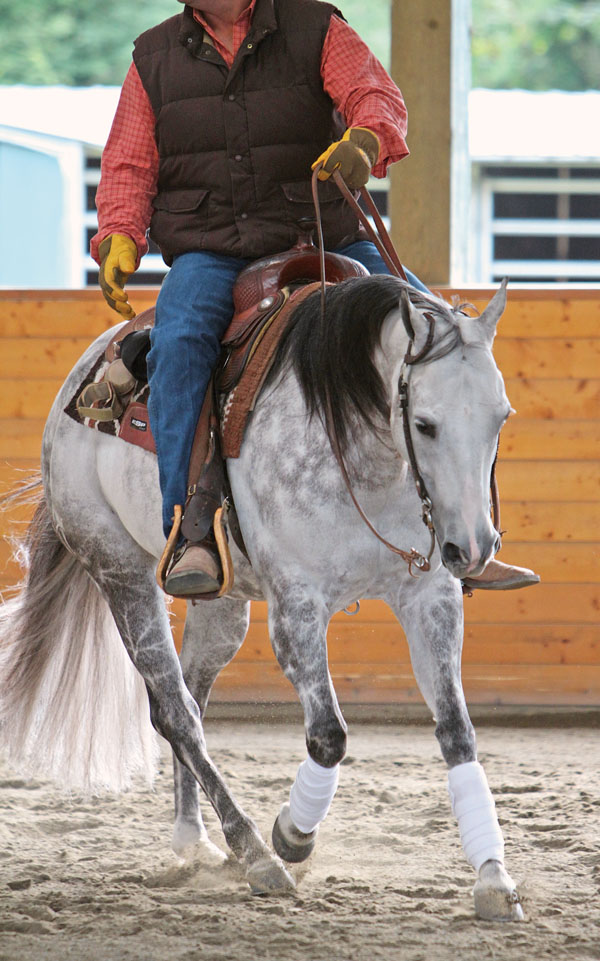Q: How do you work a horse through show anxiety? I have a horse that achieves great practice runs at home—and even in the practice arena at an event—but when it comes time for the competition, he acts skittish during speed events. Do you have any suggestions for helping him overcome his anxiety? He’s been trained by my 15-year-old daughter who’s been riding for eight years, two years specifically on this horse.
[READ: Calm a Nervous Horse]

Ami Peterson, Via Facebook
A: Ami, judging by the information you’ve provided, you’re dealing with a common problem horses and riders encounter when they leave home for any event, whether it’s a horse show, a barrel race, a trail ride, or even just a trip to the vet: situational anxiety. Adding another stressor, such as the extra speed you might ask for at a barrel race, magnifies those feelings.
Here I’ll outline five tips to keep in mind when riding this horse, and really any horse, in a new situation.
Foundation Is Everything
Whenever a rider has a problem, I tell them to look at the horse’s foundation first. If there are any holes—even tiny ones—in his foundation, they’ll show when he’s tested, anxious, or unsure. Some key foundational elements include yielding properly to the rider’s reins and legs, going forward without resistance or hesitation, and overall softness throughout the horse’s body—at his poll, through his neck, and throughout his barrel and hindquarters.
Here’s an example from my life that might resonate with you. When I was a teen, I had a horse I’d trained myself. I took him to a friend’s house to ride, and we unexpectedly had to move cattle. The problem was, my horse had never seen cattle; this was his first time to ride outside the arena. I was nervous, but because we’d worked so much on basics and responding without hesitation or resistance, he listened to everything I asked him to do. Did he perform like a perfect cow horse? Not at all. But he was really good for his experience level.
Simulate the Situation at Home
Setting up the competitive situation at home allows your horse to confront his nerves in his safe home environment. Practice every element of the cue you’ll use at home, and get as solid as possible. Practice as closely to how you’ll ride at the show so your horse knows what to expect from you. If you’ll ask for extra speed at the event, test it out at home first.
Also consider paid warm-ups and schooling shows as opportunities to put your horse in a stressful situation and work on his reactions.
Don’t Go Changing
See a new technique or riding style that you admire at the show? Make note of it and try it at home. Don’t completely change your riding style once you get to the event. It’s unfair to your horse. He has has one constant between home and a scary fairgrounds: you. He doesn’t need you to change your riding style to mimic someone else’s when he’s already dealing with unexpected variables.
Furthermore, he can 100-percent detect your nerves and anxieties. Your horse relies on you to be his confident leader. Keep as much the same at an event as it is at home, all the way down to grooming and saddling. Your horse is a creature of habit and routine. Erratic, unexpected changes aren’t fair to him and will unravel his confidence.
Get Over Yourself
Work on easing your own jitters by grounding yourself with confidence that you’ve done all the work at home. Focus on your horse and your riding to divert your attention from your own nerves. Be focused and 100-percent there for your horse. Faking it until you make it means your horse will remain calm and confident. And you might even convince yourself that you possess the leadership skills needed in the process.
[READ: Cure Your Horse Show Jitters]
Seek Extra Help
Especially in a situation like this, where your daughter is a young rider, keep her safety at the top of the priority list. When a horse’s anxiety rises to the level of feeling threatened, he won’t think twice about your daughter; his own safety will come first. Keep her safe by seeking help from a skilled professional trainer. Your daughter will learn a lot in the process, as well as keep out of danger.
Ty Brazeal is a lifelong horseman who specializes in proper foundation training for horses of all ages and disciplines. Many of those he works with go on to compete in reining, roping, barrel racing, competitive trail, and other events. He also helps recreational riders. Brazeal conducts clinics throughout the southwest and California and provides colt-starting and rehabilitation services from his home in Phoenix, Arizona (tybrazeal.com).






